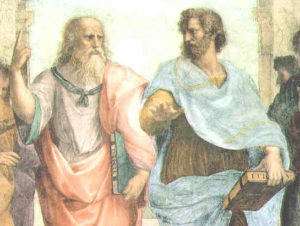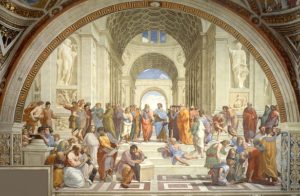
In the introduction to their edited collection, Landmark Essays on Writing Across the Curriculum, Charles Bazerman and David Russell (1994) explain how specialized discourses are grounded in the rhetorical theory that dates back to the Ancient Greeks and the debates and discussions that were shaped by the Sophists, Plato, and Aristotle. Bazerman and Russell explain that “[a]s there are professional rivalries today, so there were battles among the technai in the fifth century b.c.e., as one group of practitioners challenged the knowledge or skill of another group to win social credit in some activity field” (xvii). This history interestingly parallels the evolution of the field of English over the last 60 to 70 years, as literature has sought to suppress technical communication, composition, creative writing, etc.
Yet specialized fields such as writing across the curriculum have evolved. Bazerman and Russell explain, “the Sophists were interested in the uses of discourse for training young men to speak persuasively in legal and political forums.” As such, “rhetoric became the art of civic discourse and what came to be known as liberal education” (xix), and the evolution of specialized discourses in general first became evident during the Middle Ages after the breakup of the Roman Empire: “by the twelfth century, social structures for organizing specialized knowledge had begun to evolve, and with them specialized discourses” (xxiv). The first universities began to take shape in which students could study law, theology (including religion), and medicine, and while rhetoric “was relegated to lower levels of teaching,” it greatly influenced the activity of law and religion.

According to Bazerman and Russell, “the Renaissance further complicated the relationship between the formal study of rhetoric and communicative practices in specialized fields.” Because of the invention of the printing press, specialized discourses were now accessible to the university while other discourses in practical arts and technology such as martial arts, mining, herbal lore, and shipbuilding began to evolve. The fourteenth century humanist revival of classical learning and education reinstituted and encouraged the study of rhetoric in the university, but it in turn “militated against the acceptance of specialized discourses as objects of study” (xxv). Humanist education was highly literary and Ciceronian prose was the compositionist ideal.

Other individuals such as Francis Bacon (16th century), Joseph Priestly and Adam Smith (17th century), and Hugh Blair, George Campbell, and Richard Whately (19th century) have influenced the ebbs and flows of rhetoric over the course of time. In spite of what rhetoric has endured over the last 16 centuries, it has proven, in one way or another, to be foundational in every discourse, even supporting specialized discourses such as writing across the curriculum. But if rhetoric is so foundational to the many disciplines, why do we, scholars of English, continue to struggle to locate ourselves? Bazerman and Russell’s essay is useful in identifying and understanding the theoretical underpinnings of not only the field of English but also WAC as a subdiscipline, and I expect this work will be useful to me as I continue to work to locate myself within our field.
Bazerman, C., & Russell, D. (Eds.). (1994). Landmark essays on writing across the curriculum. New York, NY: Hermagoras Press.
